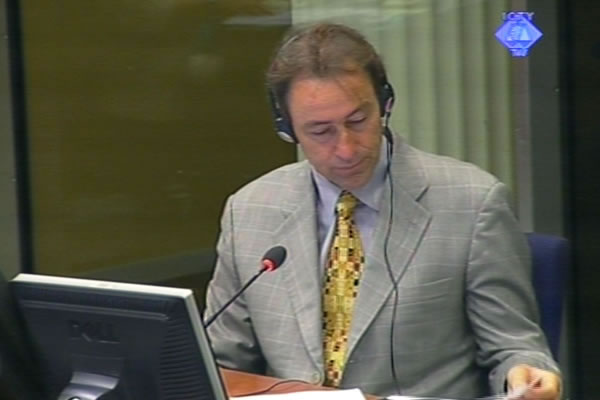Home
HARLAND: MLADIC WAS A FRUSTRATED COMBATIVE BULLY
Former chief of the civil affairs in the UN mission in BH, David Harland, described Ratko Mladic as a frustrated, combative bully. It was impossible to speak ‘rationally’ with Mladic and he ‘didn’t have any kind of a vision’ as to how to win the war despite the uncontested military supremacy he enjoyed. According to Harland, Mladic’s strategy was based on ‘terrorizing civilians’
 David Harland, witness at the Ratko Mladic trial
David Harland, witness at the Ratko Mladic trial Ratko Mladic’s trial continued with the evidence of David Harland, who served as the chief of the civil affairs in the UN mission in BH from June 1993 to the end of the war. Harland testified about the artillery and sniper terror against civilians in Sarajevo, the attacks on the safe area of Gorazde and the events that preceded the attack on Srebrenica in July 1995. Harland also spoke about some 20 meetings and conversations with the accused Mladic.
At those meetings, ‘Mladic sat and wrote down notes into his diary. He would then take the floor and very aggressively present a series of points which were not logically linked’. According to the witness, Mladic was ‘self-confident and combative’. Harland recalled that a young Serb officer came to a meeting bearing the news that Izetbegovic had failed to agree to Owen’s and Stoltenberg’s peace plan. Izetbegovic wanted more territory, the officer said. When Mladic heard that, he laughed and said, ‘I would like to be young and good-looking but that isn’t going to happen’.
Mladic listed harsh measures he intended to take in order to step up the pressure on the Bosnian government. He also refused to cooperate to rescue the wounded UN soldiers. It was the ‘standard behavior of the Serb leadership’: when they didn’t like something they would threaten to retaliate against civilians and the UN. If, for example, the Serb side didn’t get oil, Mladic would say he would ‘hijack’ oil supplies and establish a ‘new policy’: ‘nobody else will get the stuff that Serbs are not getting’. He would not allow UNPROFOR and UNHCR to monitor the developments on the front lines and to deliver humanitarian aid to the civilians.
The Serb political and military leadership, headed by Karadzic and Mladic, used ‘eight basic levers’ to pressure the Bosnian government, the witness said. Shelling, sniping and restricting basic supplies – including food, water, electricity and gas – were among them. Seven of the eight levers targeted the civilians. The Bosnian Serb leadership had its hand on the ‘terror tap’, increasing pressure when they wanted to wring political and military concessions out of the Bosnian government. When they felt they were courting an international intervention, the Bosnian Serb leadership would reduce the pressure.
In Harland’s opinion, Mladic was ‘frustrated both as a military commander and as a person’. Mladic saw himself as an efficient commander and blamed the political leaderships for the failure to translate the military effectiveness in the field to other areas. At the height of the war, Mladic was centre stage, only to find himself suddenly pushed into the wings; as a result, he became ‘very vocal’.
At a meeting in November 1993, Mladic was with the witness when he threatened he would ‘kill everyone in the Eastern enclave except children’ unless the enemy side released all the captured Serbs. Mladic voiced such threats quite often, and this was cause for concern among the UN staff. Generally speaking, ‘conversations with Mladic were not rational’, the witness concluded. When UN representatives protested against something the Serb side had done, Mladic’s response was hostile. ‘He was like a bully’, Harland said.
Based on their conversations with Mladic, Harland and other UN representatives concluded that he ‘didn’t have any kind of a vision’ as to how to win the war, ‘except by terrorizing civilians’. This was despite the uncontested military supremacy of the Serb side. Mladic’s strategy was based on capturing territory, killing or expelling the people and forcing them to cram into an enclosed area. Mladic would then cut off gas, electricity and water supply and expect the Bosnian government to adopt a position which would jibe with his own. Mladic was frustrated because the Bosnian side refused to play that game.
David Harland continues his evidence on Wednesday, 11 July 2012, in the morning.Linked Reports
- Case : Mladic
- 2012-07-09 ORDEAL OF MUSLIMS FROM VILLAGE OF HRVACANI
- 2012-07-09 MLADIC’S DEFENSE: TRIAL CHAMBER SUCCUMBED TO THE POLITICAL PRESSURE FROM THE PROSECUTION
- 2012-07-05 MLADIC’S MOTION TO POSTPONE EVIDENCE OF THREE WITNESSES DISMISSED
- 2012-07-11 DEFENSE: SERBS DID NOT TERRORIZE SARAJEVO, THEY SANCTIONED IT
- 2012-07-12 MLADIC IS UNWELL, TRIAL ADJOURNED
- 2012-07-13 MLADIC UNDERGOES MEDICAL TESTS
